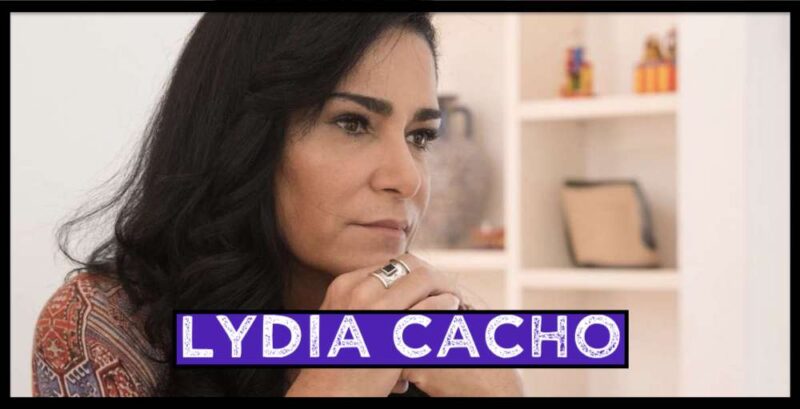
Lydia Cacho is a Mexican journalist who denounces the prostitution of Argentinean and Cuban girls in the city of Cancún.
In 2003, she wrote articles in another newspaper about cases of sexual abuse of minors. Since the mid-1980s, Lydia Cacho has written extensively in newspapers and magazines about human trafficking, organized crime, drug trafficking, gender-based violence and official corruption. She then specialized in the defense of women’s rights and, in 2000, she founded a Center for Comprehensive Assistance to Women, based in Cancun, for victims of violence and abuse. During her various research/investigations, she uses a hidden camera, disguises herself as a nun or a prostitute, not hesitating to put herself in danger to infiltrate these opaque environments. She even wore a GPS device so that her body could be found in case she was murdered, as has happened to many other Mexican colleagues. It should be noted that between 2000 and 2020, 137 journalists from the country were murdered. In her book entitled “Los demonios del Edén” (The Demons of Eden), published in 2004, she advances on a minefield by denouncing a child pornography and prostitution network involving businessmen close to the then governor of Puebla Mario Marín. Some of the names cited are: Jean Succar Kuri, Emilio Gamboa Patrón, Miguel Ángel Yunes and Kamel Nacif Borge. Lydia Cacho asserts that Succar had strong support within the PRI, a dominant party in Mexico, including that of former president José Lopez Portillo, and that he often served as Nacif’s nominee. A shareholder of Tarrant Apparel Group (TAG), Succar financed the construction of the Marriott Hotel in Cancun and the famous Caesar’s Palace Casino in Las Vegas. Succar, a Mexican of Lebanese origin, who also boasts of abusing five-year-old girls, was arrested in 2004 in the United States, where he is awaiting extradition to Mexico.
This bomb was not long before the different protagonists reacted and in December 2005, she was stopped by a dozen policemen who, without a warrant, forcibly took her from Cancun to Puebla in a vehicle belonging to textile businessman José Kamel Nacif. During the interminable drive from Cancun to Puebla, a journey that lasted more than 20 hours, the journalist recounts that she was physically and psychologically tortured by henchmen, corrupt police officers. She has also been subjected to molestation, sexual advances, and death threats. She recounts that upon her arrival, female guards warned her that she was at risk of being raped in prison “with a stick”, that she was locked up in a “dirty dungeon” and that these men took naked pictures of her near a room full of judicial police officers behind a two-way mirror. Lydia is then certain that it was Nacif who ordered this abusive arrest. She was released on bail after a few days and the case made a lot of noise, mobilizing Reporters Without Borders, the Inter-American Press Association and the European Parliament, but she was still charged. But in 2006, La Jornada, a daily newspaper in Mexico City, published recordings of telephone calls between Nacif Borge, “the king of blue jeans”, owner of textile factories in the state of Puebla, and the governor, Mario Marín, highlighting the plan to kidnap and torture Lydia Cacho to silence her and which would also protect her friend Succar, accused of paedophilia. Other names appeared: that of Pablo Salazar Mendiguchía, names of entrepreneurs in the textile sector, including a Frenchman named “Hubert”, Luis Angel Casas who is the financial coordinator of Mario Marín’s electoral campaign, Hanna Nakad Bayeh, known as “Juanito”, and a journalist from a national daily newspaper and a radio station called Andrés or “Muñeco”. It’s a second bomb!
One month later, on March 13, 2006, the journalist denounced the two protagonists before the Special Prosecutor’s Office for crimes related to violence against women and the Special Prosecutor’s Office for crimes committed against journalists. She also filed a complaint against the then lawyer from Puebla, Blanca Villeda, and the judge Rosa Celia Pérez González, accused of crimes of corruption, influence peddling, abuse of power, attempted rape, and false declarations. The case will go far as it will be brought before the Supreme Court of Justice of the Nation (SCJN). Minister Juan Silva Meza will even write a document recounting the attacks against the journalist. The level of corruption was such that the case was closed on November 29, 2007, with ministers concluding that there had been no serious violation of their individual guarantees, or “insignificant” ones. A blow to Lydia Cacho and Mexican journalism. “The Supreme Court has ruled that corrupt politicians always have more power than the victims of crimes”. Arrest warrants were issued against the main protagonists and Governor Marín was arrested and imprisoned. José Kamel Nacif is believed to be in Lebanon, a country with which Mexico does not have extradition treaties, so he is safe. In December 2014, the former commander of the ministerial police of Puebla, José Montaño Quiroz, was arrested for acts of torture and sentenced to 5 years in prison in 2017. In December 2018, it was the turn of ministerial agent Alejandro Rocha to be arrested. On January 10, 2019, the federal government finally issued a public apology to the journalist after the United Nations Human Rights Committee found her detention punitive and arbitrary. Nevertheless, Lydia Cacho still receives death threats and she must flee Mexico in 2021 to seek refuge in Spain. A terrible fact: 98% of crimes against journalists in Mexico go unpunished. In other words, corruption and its numerous agents have free rein to organize their mafia affairs.
#Fsociety
